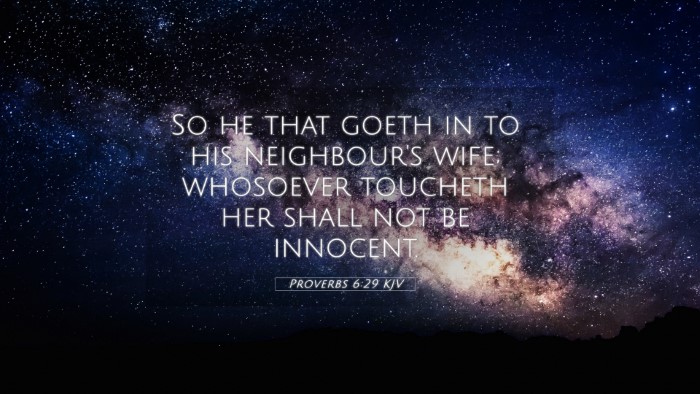This section features a detailed cross-reference designed to enrich your understanding of the Scriptures.
Below, you will find carefully selected verses that echo the themes and teachings related to Proverbs 6:29 KJV. Click on any image to explore detailed analyses of related Bible verses and uncover deeper theological insights.
 Malachi 3:5 (KJV) »
Malachi 3:5 (KJV) »
And I will come near to you to judgment; and I will be a swift witness against the sorcerers, and against the adulterers, and against false swearers, and against those that oppress the hireling in his wages, the widow, and the fatherless, and that turn aside the stranger from his right, and fear not me, saith the LORD of hosts.
 Ezekiel 22:11 (KJV) »
Ezekiel 22:11 (KJV) »
And one hath committed abomination with his neighbour's wife; and another hath lewdly defiled his daughter in law; and another in thee hath humbled his sister, his father's daughter.
 Jeremiah 5:8 (KJV) »
Jeremiah 5:8 (KJV) »
They were as fed horses in the morning: every one neighed after his neighbour's wife.
 Proverbs 16:5 (KJV) »
Proverbs 16:5 (KJV) »
Every one that is proud in heart is an abomination to the LORD: though hand join in hand, he shall not be unpunished.
 2 Samuel 11:3 (KJV) »
2 Samuel 11:3 (KJV) »
And David sent and inquired after the woman. And one said, Is not this Bathsheba, the daughter of Eliam, the wife of Uriah the Hittite?
 2 Samuel 16:21 (KJV) »
2 Samuel 16:21 (KJV) »
And Ahithophel said unto Absalom, Go in unto thy father's concubines, which he hath left to keep the house; and all Israel shall hear that thou art abhorred of thy father: then shall the hands of all that are with thee be strong.
 2 Samuel 12:9 (KJV) »
2 Samuel 12:9 (KJV) »
Wherefore hast thou despised the commandment of the LORD, to do evil in his sight? thou hast killed Uriah the Hittite with the sword, and hast taken his wife to be thy wife, and hast slain him with the sword of the children of Ammon.
 Leviticus 20:10 (KJV) »
Leviticus 20:10 (KJV) »
And the man that committeth adultery with another man's wife, even he that committeth adultery with his neighbor's wife, the adulterer and the adulteress shall surely be put to death.
 Genesis 26:10 (KJV) »
Genesis 26:10 (KJV) »
And Abimelech said, What is this thou hast done unto us? one of the people might lightly have lien with thy wife, and thou shouldest have brought guiltiness upon us.
 Genesis 12:18 (KJV) »
Genesis 12:18 (KJV) »
And Pharaoh called Abram and said, What is this that thou hast done unto me? why didst thou not tell me that she was thy wife?
 Genesis 20:4 (KJV) »
Genesis 20:4 (KJV) »
But Abimelech had not come near her: and he said, LORD, wilt thou slay also a righteous nation?














